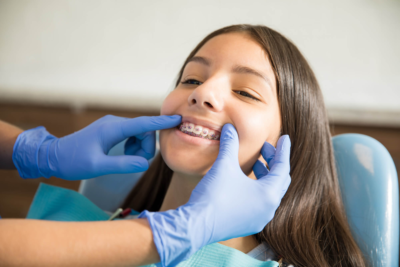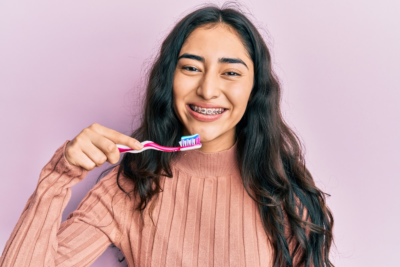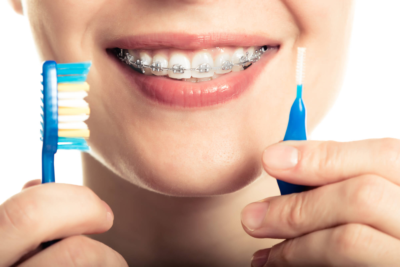Getting braces in Greenville, NC is a big change, for sure. Suddenly, it’s wires and brackets 24/7, and like anything new, there’s that initial adjustment period. But here’s the truth—it’s not as complicated as it might seem. Soon, you’ll see that those brackets will feel like second nature.
We’re here to break down what it’s really like to live with braces. Whether you’re just thinking about it or have already started, we’ll uncover the details of this experience.
 GETTING STARTED: THE INITIAL DAYS
GETTING STARTED: THE INITIAL DAYS
The Fitting Process
Getting braces fitted is a simple procedure that typically takes about 1 to 2 hours. Your orthodontist attaches small brackets to your teeth with a special glue. Wires are then threaded through these brackets, creating the structure that will guide your teeth into their new positions. While the process itself is not painful, you might feel a bit of pressure during this time.
Initial Discomfort
In the initial days, it’s perfectly normal to experience some discomfort. Your teeth may feel sore as they begin to adjust to the new hardware. This is temporary and it’s a sign that your braces are doing their job.
Tips for Managing the First Few Days
In the initial days, consider the following:
- Soft and Soothing Foods: Stick to softer foods like mashed potatoes or smoothies to avoid discomfort.
- Stay Hydrated: Water is not only essential for overall health but can also help with any dryness or irritation caused by the braces.
- Orthodontic Wax: If you experience any irritation from brackets or wires, orthodontic wax can provide a protective barrier, preventing rubbing against the sensitive tissues of your mouth.
- Pain Relief: Over-the-counter pain relievers, as recommended by your orthodontist, can help manage any soreness.
- Take It Easy: Allow yourself time to adjust. Avoid particularly hard or sticky foods, and be cautious with habits like nail-biting or pen-chewing that might stress your braces.
PRACTICAL ASPECTS OF LIVING WITH BRACES
Eating with Braces
Choosing the right foods is important for a smooth experience with braces. While you might need to make some adjustments at first, it gets easier over time.
Braces-Friendly Foods
Even after the early stages of having braces, it’s wise to stick to softer options to avoid unnecessary stress on wires and brackets. Consider these braces-friendly options:
- Soft Fruits: Opt for easily chewable fruits like applesauce, bananas, and berries.
- Cooked Vegetables: Enjoy the goodness of vegetables through steamed or boiled options, such as carrots, spinach, and beans.
- Soft Proteins: Include gentler protein sources like eggs, fish, and well-cooked meats.
- Dairy Delights: Embrace dairy in the form of yogurt, cheese, and milk-based products.
- Carb Comfort: Stick to softer carbohydrates like bread, rice, and pasta.
Foods to Avoid
Certain foods can pose a risk to your braces, potentially causing damage. It’s advisable to steer clear of hard and sticky foods like nuts, popcorn, chewy candies, and gum as they can exert excessive force on wires and brackets, leading to damage and discomfort. Additionally, stay away from crunchy fruits and vegetables such as apples and raw carrots. If not sliced or cooked, they may pose a risk by placing undue stress on braces, potentially leading to misalignments.
Eating with Braces: Tips and Tricks
Eating with braces might feel unfamiliar at first, but with practice, it becomes second nature. Here are some tips to make the experience smoother:
- Small Bites: Cut your food into smaller, bite-sized pieces. This practice not only prevents stress on braces but also makes chewing more manageable.
- Chew Carefully: Chew slowly and distribute pressure evenly on both sides of your mouth. This helps avoid discomfort and minimizes the risk of damaging your braces.
- Avoid Biting: Refrain from biting directly into hard foods. Instead, use your back teeth to distribute the pressure more evenly.
TALKING WITH BRACES
Navigating speech with braces can be a bit uncomfortable at first, but don’t worry, this is entirely normal, and there are ways to smooth out the transition.
Initial Challenges
At first, you may feel a subtle change in the way you speak. This is because your tongue and lips are adapting to the presence of braces. It’s common to encounter a mild lisp or struggle with the pronunciation of certain sounds. Rest assured, this is a temporary phase. As you spend more time with braces, your mouth will get used to the changes.
Practice Makes Perfect
To ease into this adjustment, practice speaking slowly and deliberately. Enunciate your words and pay attention to the way your tongue moves. It might be helpful to read aloud or engage in casual conversations with friends or family. The more you practice, the more confident and comfortable you’ll become.
Communication Tips
While getting accustomed to speaking with braces, consider these tips:
- Slow and Steady: Take your time while speaking. Speaking slowly and enunciating your words can help you communicate more clearly and confidently.
- Tongue Exercises: Simple tongue exercises, like gentle movements within your mouth, can enhance control and agility. Try these to improve comfort and speech with braces.
- Confidence Matters: Embrace the changes with confidence. Remember, it’s a temporary adjustment, and you’re on the path to a brighter, straighter smile.
Oral Care Challenges
Caring for your oral health becomes a slightly different ball game when you have braces in Greenville, NC. Here’s what you should know.
Guidance from Your Orthodontist
Your orthodontist is your go-to expert for navigating oral care with braces. They’ll provide personalized guidance on effective brushing and flossing techniques. Take the time to understand their recommendations and ask questions to ensure you’re equipped with the knowledge needed for optimal oral hygiene.
 Specialized Tools
Specialized Tools
With braces on, reaching every nook and cranny of your teeth becomes a bit more challenging. This is where specialized tools come into play:
- Interdental Brushes: These small brushes are excellent for cleaning between braces and wires. They reach areas that regular toothbrushes might miss, preventing plaque buildup and maintaining cleanliness.
- Floss Threaders: Flossing can be trickier with braces, but floss threaders make the process much easier. They help guide floss between wires and brackets, ensuring a thorough clean and reducing the risk of gum issues.
Embracing the New Oral Care Routine
Adjusting to a new oral care routine is crucial for preventing issues like plaque buildup and maintaining the overall health of your teeth and gums. Here’s how you can embrace this routine effectively:
- Be Diligent: Consistency is key. Make a conscious effort to brush after every meal and floss at least once a day. Your orthodontist might recommend additional cleaning sessions to keep your braces in top shape.
- Regular Dental Check-Ups: Scheduled check-ups with your dentist are crucial. They can provide professional cleanings, monitor your oral health, and address any concerns or adjustments needed for your braces.
- Dealing with Food Stuck in Braces: It’s quite normal for bits of food to find their way into your braces, but handling it is a breeze. A quick rinse after meals and the use of small brushes or floss will help dislodge any pesky particles.
ACTIVITIES AND HOBBIES WITH BRACES
Having braces doesn’t mean putting a pause on your active lifestyle. Whether you’re into sports, outdoor adventures, or artistic pursuits, here’s a guide on how to handle various activities while rocking your braces in Greenville, NC.
Addressing Concerns
While it’s natural to have concerns about engaging in physical activities with braces, rest assured that with a bit of precaution, you can participate in most activities without any issues.
For example, if you’re into contact sports like football or basketball, consider wearing a suitable mouthguard to protect your braces and teeth. Discuss with your orthodontist to find the best option for your specific needs.
On the other hand, if you’re a musician, you should know that playing musical instruments is absolutely feasible with braces. You may experience an adjustment period, but with practice, you’ll adapt. Brass and woodwind musicians may find orthodontic wax helpful in preventing irritation.
Handling Emergencies with Braces
Living with braces comes with its own set of practical considerations, and being prepared for potential emergencies is a key aspect of this experience.
Wire or Bracket Breakage
Sometimes, wires or brackets might break or become loose, causing discomfort. In such cases, don’t hesitate to reach out to your orthodontist for guidance. While awaiting their advice, applying orthodontic wax to any sharp edges can provide temporary relief.
Discomfort Beyond the Usual
If you experience persistent discomfort or soreness beyond the usual adjustment periods, it’s crucial to consult your orthodontist. They can assess the situation and make any necessary adjustments to ensure your braces continue to work effectively.
Objects Lodged in Braces
If an object becomes lodged in your braces and you can’t remove it with gentle rinsing or brushing, seek professional help. Avoid using sharp objects or excessive force to prevent damage.
Unexpected Oral Injuries
In the event of unexpected oral injuries, such as a significant blow to the face, contact your orthodontist or seek emergency dental care. They can assess the impact on your braces and address any potential issues.
 READY TO GET BRACES IN GREENVILLE, NC?
READY TO GET BRACES IN GREENVILLE, NC?
Living with braces is a unique experience, and at Michels & Gauquie DDS PA, we’re here to guide you through every step. Whether you have questions, need emergency assistance, or are ready to start your path to a confident smile, our expert team is just a message or call away. Contact us today to schedule a consultation and discover the personalized care that makes your orthodontic experience exceptional.



